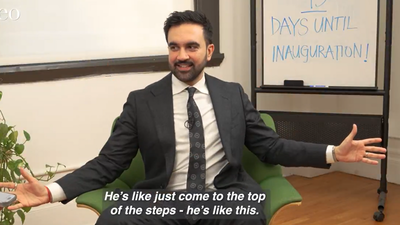New York City mayor-elect Zohran Mamdani opened up about his transition, political pressures and even his Bollywood music knowledge, at one point dropping into the iconic Shah Rukh Khan pose, in an exclusive conversation with British journalist Mehdi Hasan. The interview was recorded inside his campaign headquarters that he will soon vacate and marks Mamdani’s first major sit-down since his election victory earlier this month against independent candidate Andrew Cuomo. The Zeteo interview also featured a fun Bollywood guessing game. Hasan quizzed him on Indian classics like Chaiyya Chaiyya, featuring Shah Rukh Khan. It was a fitting moment for a politician whose victory speech itself ended with the iconic beat of Dhoom Machale.
Mamdani was polling at just 1 per cent last December before an appearance on Hasan’s show sent his campaign viral. After winning the Democratic primary and rallying more than 100,000 volunteers into an unstoppable force, he spoke to Hasan again just weeks before Election Day while facing coordinated Islamophobic attacks.The socialist is set to assume office on January 1, 2026.Mamdani talked about how he hopes to carry out an ambitious affordability agenda inspired by FDR. He described some of the early choices shaping his transition, including all the unsolicited advice pouring in from uncles and aunties in his family and his plan to keep NYPD Commissioner Jessica Tisch. He also shed light on growing normalisation of Islamophobia and said he is seriously worried about the security of his phone number.Speaking about national politics, Mamdani threw an interesting and contrasting point of the two major parties. He said that Republicans tend to approach politics with an imagination that keeps expanding, pointing to ideas as absurd as buying Greenland. Democrats, he argued, often seem trapped in a mindset where the sense of what is possible keeps shrinking. He said, “Republicans, they have a sense of imagination that is ever-expanding. It can extend to purchasing Greenland. And Democrats, it feels as if we are often in an exercise of an ever-lowering ceiling of possibility.”




